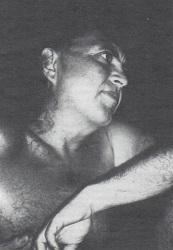The Call for Spiritual Leadership
“how can you guarantee that there are such (mature) people from generation to generation? Or that in the future this principle will actually be in effect? You cannot guarantee it. You can only serve the optimum development of such a circumstance and create a climate of self-criticism, so that the Communion will deal with its own limitations in time.”

in
The Climate of self-criticism
 nly our actual practice of the Way keeps us aligned to Heart-Master Da, Who is the Source of the entire Way of the Heart. We will not embody a self-transcending relationship to the Communion if we are not practicing self-transcendence in relationship to everything that is arising. Without submission to what is Great, the ego will continue to assert itself, creating conflict, confusion, and chaos. Knowing full well the tenacious and subversive nature of the ego – even in a good-hearted beginner with the best intentions – Heart-Master Da Love-Ananda has called for mature devotees to lead the Communion. Only through the guidance of such devotees will the institution and Community stay aligned and be effective in the world.
nly our actual practice of the Way keeps us aligned to Heart-Master Da, Who is the Source of the entire Way of the Heart. We will not embody a self-transcending relationship to the Communion if we are not practicing self-transcendence in relationship to everything that is arising. Without submission to what is Great, the ego will continue to assert itself, creating conflict, confusion, and chaos. Knowing full well the tenacious and subversive nature of the ego – even in a good-hearted beginner with the best intentions – Heart-Master Da Love-Ananda has called for mature devotees to lead the Communion. Only through the guidance of such devotees will the institution and Community stay aligned and be effective in the world.
” The necessary leadership, manifested either in single individuals or in a group of individuals, combines management expertise and mature Spiritual understanding, although the senior, guiding principle must be Spiritual.”
Mature devotees may not necessarily embody the same character traits or business expertise as the leaders of conventional organizations. Corporate executives, for example, often manage through the force of their strong wills and personalities. Likewise, conventional religious groups thrive on charismatic leaders who can generate cultic enthusiasm in others. Genuine practitioners, on the other hand, are qualified to guide sacred institutions by virtue of their practice and their understanding of the Spiritual principles that distinguish sacred organizations from secular groups. At the same time, our experience in the last fifteen years demonstrates that more is required than strength of personality or conventional training to effectively manage the Communion and the Community. The necessary leadership, manifested either in single individuals or in a group of individuals, combines management expertise and mature Spiritual understanding, although the senior, guiding principle must be Spiritual.
“sign of a mature devotee is that he or she practices for the sake of others.”
Devotees need look no further than Heart-Master Da Himself to see these qualities embodied. He has Demonstrated in countless ways over the years how a Spiritual leader must embody compassion in addition to right understanding. Heart-Master Da has said that a sign of a mature devotee is that he or she practices for the sake of others. This mood of self-giving and sacrifice not only helps others but it also inspires them to give of themselves. Again, no greater example of self-sacrifice and compassion has appeared in the lives of devotees than our Beloved Heart-Master. To do samyama1 on His life of Service is to witness an inconceivable and continuous act of Sacrifice and Giving. We need only align ourselves with His Transcendental Mood to be capable of serving each other.
In the following excerpt from a talk entitled “Sacred Institutions”, Heart-Master Da elaborates upon the necessity for mature leadership in the Communion.

HEART-MASTER DA: The Communion must be guided by senior practitioners who have an interest in preserving the Way because they practice it, and who can always temper the qualities egos introduce into sacred institutions. We need such people in our own institution. It is one thing to enhance the level of competence of management, but everything must also constantly be overseen and tempered by a senior group of practitioners. Otherwise, inevitably, without even knowing it, devotees make this and that little move, and then another one, and another one – and before you know it a whole attitude and policy are being generated that run contrary to this Way of life.
A sacred institution should be the responsibility of sacred practitioners, individuals of the highest type within their tradition. Such individuals should be the institution’s ultimate resort and conscience.
“You can only serve the optimum development of such a circumstance and create a climate of self-criticism, so that the Communion will deal with its own limitations in time.”
It is not merely that a practicing order should be in charge, but that the Communion is the responsibility of people who have practiced the great discipline and Realization of the Way. Well – how can you guarantee that there are such people from generation to generation? Or that in the future this principle will actually be in effect? You cannot guarantee it. You can only serve the optimum development of such a circumstance and create a climate of self-criticism, so that the Communion will deal with its own limitations in time.
If you yourself are committed to the Way of life of ego-transcendence, then you must likewise, in your service to the Communion, make it operate in this ego-transcending manner. Do not let the Communion be an ego. You really cannot model an institution after the ego if its very members are devoted to the transcendence of the ego. Sacred institutions, therefore, must operate in a different fashion from worldly institutions. That they do not is a sign that they are not any different from worldly institutions. (June 21, 1982).
